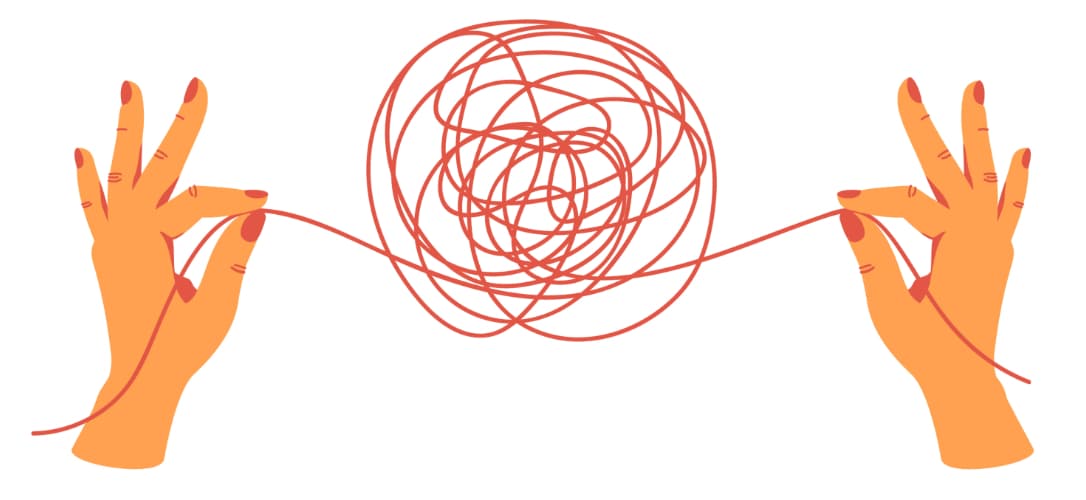Got Coronanxiety? Here's How to Look After Your Mental Health
08 April 2020 • 9 min read
If you’re struggling with your mental health, anxiety or stress due to the recent coronavirus outbreak, then you’re not alone. Here are some things you can do to give your mental health a boost.
It’s likely that you’re spending a lot more time at home during the recent pandemic. Being thrown out of your routine, not seeing your family or friends, and being stuck inside can all take its toll.
To give you a hand, we’ve rounded up the best advice from mental health experts from around the web in this definitive list of mental health advice. So, if your mental health has taken a hit, then here are some ways you can help.
What’s in this guide?
Looking for some specific advice? Here's what's covered in this guide.
👉 Get into a routine
👉 Limit your social media
👉 Stay connected
👉 Managing anxiety and stress
👉 Working from home
👉 Staying active at home
👉 Quick ways to feel better
👉 For more help
Get into a routine
It can be tempting to slip into unhealthy routines during this pandemic. You won’t be going to university lectures, your part-time job, or your regular Monday night pub quizzes – so your regular routine is probably out the window. And adapting can be hard.
It’s important to create a routine while self-isolating, so it’s easier for you to keep up healthy habits. This may sound silly; how can you stick to a routine when you’re at home all day? But working on this keystone habit will keep your stress levels down, your sleep schedule proper, and your mental health stable.
Make sure you’re getting up at your usual time every morning and going to sleep at a reasonable time too. Keep to your ordinary mealtimes, and make sure to get dressed every morning. Hell, even stay up later on a Friday evening, or have that lie-in on a Saturday morning! Try to stick to your regular lifestyle as much as possible.
It’s important to have things to look forward to, so making plans will do wonders for your mental health. Keep your weekends separate from your weekdays, plan to do certain things on certain days, and schedule in those regular Tuesday evening movie nights on FaceTime with your mates.
If you’re looking for tips on how to be productive during the quarantine, check out our blog on how to be productive here.
Has your screen time skyrocketed over the last few weeks? Yeah, ours too. Social media can be a great outlet for passing some time and switching off every now and then. It’s important to allow ourselves downtime, and to not put pressure on ourselves to be doing absolutely-everything-all-the-time. But, with all of this extra time on our hands, it’s easy to get carried away.
Endlessly scrolling through TikTok can definitely pass the time, but it’s WAY easier to lose a few hours than it should be. Spending too much time on social media can cause excess stress, and the constant conspiracy theories and news articles can impede on your mental health.
Create time limits on your scrolling and set aside certain times of the day where you avoid any screens. For example, try avoiding your phone during mealtimes, or before 11am. Putting strict time limits in place can do wonders for your mental health. It frees up your headspace to focus on other things and allows you to step away from the endless Twitter threads about the coronavirus.
Stay connected
Make sure you stay in direct touch with your friends and family - especially if you’re isolating alone. If possible, chat to people over the phone or video chat. Texting can be loads easier, but you miss out on that direct connection.
Schedule regular conversations with your parents or guardians if you’re not living together. Or, if you’ve moved home for the summer, set up a pub quiz with your uni mates. Keeping in touch doesn’t have to be difficult, and even dropping your friends a text to check they’re doing okay is a good idea.
Dr Nihara Krause, CEO of mental health charity stem4, says it’s important to view social distancing as ‘contact distancing’ rather than distancing from friendships. She says: “Whilst social distancing and loneliness are not the same, the feelings that are generated may be experienced in the same way.” She advises countering these emotions by reaching out to someone every day.
By striking up a conversation with someone daily, you stimulate that part of your brain that’s craving some connection. Going days at a time without talking to someone can be easy, especially if you’re isolating alone, but humans are social creatures (yes, even you die-hard introverts). We need face-to-face connection, and chatting to someone – even if it’s just for five minutes on the phone – makes a massive difference to our mental health.
Managing anxiety and stress
For those experiencing corona-anxiety, or excess stress due to the circumstances, you’re not alone. Perhaps you’re unable to do things that are your usual stress relievers, such as going to the gym or seeing friends. Maybe the uncertainty of the coronavirus outbreak is impacting your anxiety levels and affecting your mental health. If so, there are ways to help.
Here are some things we recommend doing if you’re experiencing excess anxiety or stress:
- Limit your news intake Avoid speculation by looking up reputable sources for information on the outbreak. The Mental Health Foundation says: “Rumour and speculation can fuel anxiety, and having access to good quality information about the virus can help you feel more in control.” So, stick to the BBC or GOV.UK websites for accurate reporting. It’s also worth only checking the news once or twice a day.
- Help others Getting involved in volunteering opportunities is a great way to help your local community. Reach out to your neighbours, post in local Facebook groups, or simply help out elderly/vulnerable friends or relatives. Whether it’s through delivering groceries or chatting on the phone to those in need, getting involved in your community will lead you to feeling less isolated.
- Talk to someone If you’re struggling with being stuck at home, talking to someone can be a great form of release. Whether it’s a family member, a work colleague, a uni friend or a mental health professional, expressing how you’re feeling can help to relieve you of your anxiety or stress. We’ve listed some important contact information for mental health charities at the bottom of this article.
Working from home
If you’re working from home during the coronavirus outbreak, having a proper work-life balance can be difficult. Making the transition from office working to home working can lead to a change in working behaviour. You’re no longer working alongside colleagues, you’re in a different working environment, and you’re possibly surrounded by different distractions.
Bringing your working life into your home can lead to you working longer hours with fewer breaks, seeing less of your peers, and possibly struggling with your work-life balance. All of this can negatively impact your mental health.
Mental health charity Mind recommends the following to ensure you’re taking care of yourself while working from home:
- Check in with team members regularly via video calls, instant messaging and group chats.
- Form new ways of working, such as determining how you and your team communicate, evaluating your desk setup, and creating a working-day routine.
- Establish a difference between work and play by having regular breaks away from your desk, taking your full lunch break, and not doing work in non-work hours, such as evenings.
Check out Mind’s article on supporting yourself through working from home here.
Staying active at home
Movement is important for stable mental health. If you’re able to, utilising your allotted daily exercise is guaranteed to give you a serotonin boost. Not only is moving important, but getting outside as frequently as possible is sure to give you a fresh perspective.
If you’re self-isolating and can’t go out for a walk, getting out into your garden or on a balcony can help, or even opening a window to get in some fresh air. Try to do it away from any screens.
Exercising from home is more accessible than you think. Whether it’s doing yoga, chair-based exercises, bodyweight movements, or even just dancing round the house, you don’t need a bunch of equipment to get a good sweat on. There are hundreds of exercise videos on YouTube and Instagram, so have a look around for something that suits you. Just committing to 10-minutes is enough to start with to really feel that energy boost.
Quick ways to feel better
If you’re looking for some quick ways to boost your mental health, here’s what we recommend:
- Clean your space If you’re twiddling your thumbs for something to do, cleaning your space is a great option. Having a spring clean can have a massive impact on your mental health, as your space often directly effects your headspace. Set a timer for 30 minutes and do what you can.
- Call a friend Give your best mate a ring for 10 minutes or have a quick catch up with a family member. They’re probably in as much need of a quick call as you are.
- Go outside Make yourself a cuppa and go and sit in the garden - or by an open window - for a quick pick-me-up. Leave your phone inside and soak up the fresh air.
For more help
If you’re looking for some more help and would like to chat to someone, the following helplines are available:
- Calm is available 5pm-midnight, 365 days a year on 0800 58 58 58, or via webchat
- Nightline is available for students up and down the country, check your university’s Nightline support here
- Samaritans are available on 116 123 for free
- Alternatively, booking a telephone appointment with your GP to talk through things is a great option for those wanting medical help or advice





